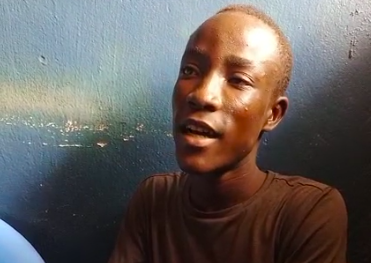Liberia: Boy Accused of Raping 3-Yr-Old Denies Accusation

Kwesi, who is alleged to have raped a 3-year-old girl, says he's innocent.
The 17-year old boy, Kwesi Johnson, who was accused of raping a 3-year-old girl in the Soul Clinic Community, has denied the allegation.
Kwesi, in an interview at Soul Clinic Police Station in Paynesville City, did not just deny the allegation against him, but said he was being falsely accused simply because “I am friendly and treat children with care”.
“To tell the truth I don’t know anything about that thing, but because I am friendly with all the children. I don’t have a bad heart, I don't pick among children so they said it’s me,” disclosed Kwesi in a ten minutes video interview posted on social media by Lawrence Dayougar. The Daily Observer has confirmed the authenticity of the video, which was conducted at the Soul Clinic Police Station.
Kwesi then alleged that the victim has been raped before by her uncle multiple times -- but the mother and grandmother have kept quiet on grounds that it is a family matter. He added when the minor pointed at her uncle, she was beaten.
“It’s not her first time, her uncle (known as Josiah) can do it [rape] to her. Her mother and grandmother have seen him doing it to her. Even people in the community are aware of this,” he alleged.
Meanwhile, efforts to get a response from the victim’s family to Kwesi’s allegation did not materialize, as they were at a hospital taking care of the girl.
The issue of rape in Liberia has been on the increase despite thousands of Liberians protesting against the crime in 2020 in a bid to draw local and international attention to the country’s alarming rate of sexual assault.
Rape has been a long-standing concern and a United Nations report in 2016 recorded 803 rape cases the previous year and found only 2 percent of sexual violence cases led to a conviction. Harrowing tales of sexual violence against girls as young as three years old are nothing new. It is an issue that is among the many crimes that are the result of the legacy of the country’s 14-year civil war between 1989 and 2003 when rape was commonplace.
Moreover, a heavily underfunded and weak judicial system and the culture of impunity continue to fan the rape epidemic. Alternative justice for rape victims in a highly traditional and patriarchal society includes traditional courts spearheaded by community leaders that have in most cases ruled in favor of offenders
The Kwesi rape allegation, which was first reported by Frontpage Africa, stated that the alleged rapist lives in the same community as the victim. The report added that the grandmother of the victim discovered the trousers of the child soaked with blood minutes after she returned from the market.
“When I asked her who did this to you, she said it was the neighbor’s son, Kwesi Johnson,” the grandmother said.
Mrs. Ne Suah Livingston, a Child Rights Advocate who runs the Rescued and Abandoned Children in Hardship (REACH), said a medical report on the minor confirmed that she was severally violated and her hymen had been ruptured as a result of the alleged rape.
“The damage done to this baby is very bad. The blood I saw coming out of her private part confirmed how terrible the situation is,” she said.
When asked if the perpetrator used his finger or his manhood to commit the act, she responded: “According to the medical report, the victim was lacerated six inches above her private part, running towards her anus. The doctor said thank God the tear did not reach her anus, or it would have been bad. Therefore, I do not think the perpetrator used his ordinary fingers to rape the child,” she said.
However, Kwesi narrated that before the allegation against him, the victim's grandmother had instructed him to beat on her anytime she cried for food and so when she did, he beat her.
“When her mother came from the market, she was still crying; that’s how she called her. When the girl came, she started picking something from the ground and then her mother saw something in her clothes (blood). So her mother came and said, ‘Aunt Sonee [a neighbor] do you see what they have done to my child?’ They asked the girl who did this, she said Kwesi beat me.” Kwesi explained.
Incidents of rape appear to have risen sharply --forcing President George Manneh Weah in 2020 to declare it a national emergency and order new measures to tackle the problem after a recent spike in the number of cases in the West African state. In that same year, Margaret Taylor, the director of Liberia’s Women Empowerment Network, said her NGO had recorded 600 cases of rape between June and August. According to her, the number was up from between 80 and 100 cases in May.
But since then, the President has done little to fulfill his pledge of having a special prosecutor for rape in Liberia, as well as set up a national sex offender registry. And the government’s “national security task force” on sexual and gender-based violence is yet to succeed in terms of prosecution and conviction of the alleged perpetrators.
The Weah administration has purchased a DNA machine to fast-track the investigation and prosecution of rape cases, but since the machine arrived at the John F. Kennedy Medical Center in 2021, it is yet to be used due to the lack of skilled medical professionals to operate it.
